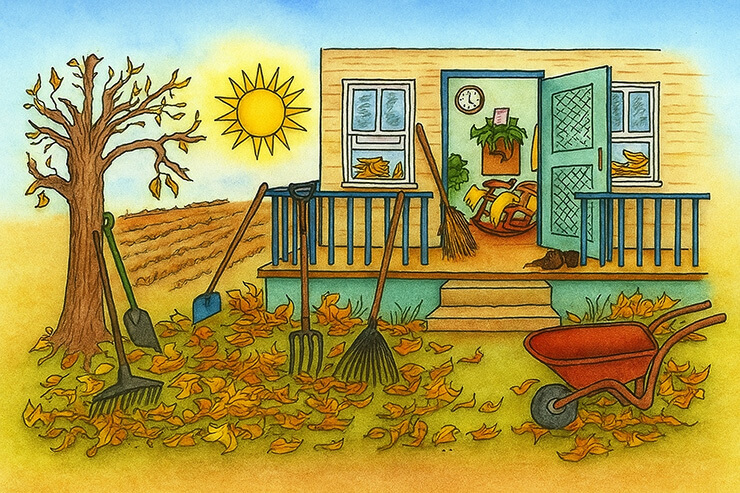Read by Matilda Longbottom

When I lived in Italy, all the women vigorously Spring-cleaned their houses before Easter. When the houses were spanking clean, the priest would come to them and bless them. Of course, since he had always come to our house, I asked him to continue doing so. Unfortunately, he ended up blessing the dirt and untidy closets in our house-which may well be the reason why they seemed to remain that way in spite of my intentions to do them “a little later.”
Good housekeepers can be judged in the Spring, but the time to judge good gardeners is in the Autumn. Lazy gardeners take Autumn as a signal to relax. The garden will survive if you don’t weed it now; there are enough tomatoes in the freezer; we can smile instead of curse when we find yet another mammoth zucchini, crouched like a plotting terrorist against the fence.
Winter will take care of it as it will of many weeds. This is the time to marvel at the bright, crispening days, to pick bunches of brilliant marigolds which (poor things) were born genetically in Mexico and know nothing of Winter. They, like the petunias and nasturtiums, will simply go on flowering in blissful unawareness until one morning the first frost reduces them to sodden black ribbons, finished forever.
The lazy gardener, like the marigolds, simply goes on basking in the sun. Real gardeners get very official in Autumn, talk about “the busiest season of the year,” tidy and rake and mulch and prune, divide and tidy a little more. And their labors are surely blessed by Autumn, by the mystical cool days and the slanting sun, by the leaves turned magically red, by the deathly frost that comes in the night without warning.
But lazy gardeners, unlike lazy housekeepers, are sometimes mysteriously rewarded by nature. If only the dust in my house, the papers that should be thrown away, the old shoes, the broken toys, the skirts that should be let out and the jeans that should be patched would turn to mulch or set seed like the debris in the garden. I’m a mother on my own in the house, but outside I have the help of Mother Nature.
Sometime, years back, I didn’t get the leaves raked. Now all Americans, gardeners or not, rake leaves in Autumn. Churches organize picnics around it, television commercials advertise rakes and leaf blowers. Even people who hardly ever go outside and whose yards consist of a patch of lawn and one tree, suddenly appear in Autumn, looking very rural, to get rid of those leaves. Townships announce the days of “leaf pickup,” and there are even special plastic bags sold in the supermarket for the purpose. Goodness, if you don’t rake leaves, you’re not only a bad gardener, you’re probably a bad citizen, as well.
Well, one year I didn’t get the leaves raked. I can’t remember now why-it wasn’t a conscious decision, but somehow one thing or another prevented me. But I do remember the guilt mounting along with the depth of the leaves. The rustling underfoot as I crossed the lawn was reminiscent of that gentle way people clear their throats in church if you arrive late or at concerts if you inadvertently clap between movements. My gardening was not “comme il faut.”
When it grew too cold to pretend I was going to do it at all, I used to wonder what would happen. Would the lawn die? Would the perennials be smothered? What would happen? I talked a lot about books that Winter but not much about gardening. After all, I could hardly claim to be a gardener with a yard like that.
That was years ago. Now, when Autumn comes and I walk through the rustling leaves, I hear only the comforting sounds of Fall-a light snore before deep sleep, rather than a reproachful cough. Because, of course, nothing “happened.” The leaves settled under the hedges, blew away across the lawn, or were broken up by frost and disappeared. The grass, far from dying, looked greener than ever. The perennials spiked out through the leaf mulch and had fewer weeds around them. It seemed I was being rewarded for my sloth. Unfortunately, a similar mulch within the house didn’t rot as satisfactorily, but at least I theoretically had more time to deal with it. Morally, too, I could now decline the annual leaf rake at church. “Oh, I’ve discovered it’s all right to leave them on the ground,” I could say. Of course, I missed out on the free juice and cookies.
Well, if I didn’t have time to rake leaves, I should, as a good gardener, have had plenty of time left to cut down the perennials and tidy the beds. Everyone knows that’s the best way to prevent the spread of disease. (It’s in all the garden books.) Who wants disease in their garden? Not me. So naturally, I will make time to cut down the perennials, pull up the dead annuals, get rid of those last weeds. Autumn is the beginning of the new garden year. I’ve often said so myself.
But there are beginnings and beginnings. Tidying up after one’s children is really a beginning, but it’s not nearly so much fun as making the children. Likewise, I always seem to find time to plant bulbs, and I always spend too much time on it. (And money. Well, who thinks about the money when they are making children?) But cleaning up?
When it gets down to it, though, what are we here for?
Plants certainly seem to concentrate their production on reproduction.
And that’s where the untidy gardener gets rewarded. Most of my flowers are self-sown. If I had weeded and cleaned as I ought to have done, they couldn’t have self-sown. Admittedly, many have reverted-the phlox are magenta and the petunias pale purple. There is far too much cleome and a very tall spindly sunflower whose tiny flowers add nothing to horticulture but which are always covered with goldfinches. Which would you choose: flowers or birds? I don’t pull up the sunflowers even though, as my mother-in-law says, their blooms don’t make “much of a show.”

Someone said all the flowers in Eden were probably magenta. If you watch self-sown plants revert to type, it certainly seems to be so. But if you think of Paradise as a future rather than a past location, it’s a different story. Assuming we have some say in this state of perfection, I suppose Paradise will be neatly raked lawns and paths, lots of pachysandra, and all the flowers we haven’t been able to achieve without Almighty help: blue roses and dahlias, pink marigolds, green daisies, lots of brown and black flowers, strawberries the size of apples and zucchini the size of peas. (If we didn’t think it would make our gardens more perfect, why do we strive so hard for these things?) Well, if I’m hoping for that kind of garden in the afterlife.
I’m quite glad to have a garden left partly to its own devices in this one. Granted, the magenta phlox look … bright … beside the orange marigolds, and the cleome should have known better than to seed itself in the front of the border. Maybe I should save the seeds and plant them where I want them, instead of leaving them to sow themselves. That would be a good thing to do after I’ve finished the raking … or tidying the house. Or should I wait? I suppose it’s possible that the sneakers will seed themselves, if I leave them undisturbed long enough.
I shall think about that while I go walk outside for a bit and admire the brilliance of the Autumn trees. After all, there won’t be many good sunny days left, and we must enjoy them while we can… ❖


 Previous
Previous



Love this story. It sounds a bit like my method of autumn gardening. Every year, I have all kinds of good intentions. I’m very grateful that I can love autumn again. For several years, we had horrible wildfires here in Northern California. I came to dread this time of year because of that. I moved back to my hometown of Sebastopol and the out-of-control wildfires in our area seem to have stopped for now. It’s lovely to love autumn again. I love the changing colors of the light and the leaves. I moved to a cute little cottage on a property that has lots of shrubs. I never lived anyplace where there are a lot of shrubs before. But I’ve been told I’m in charge of them. I bought several implements and gave it a good go the first year. Right away I learned a couple things. I have no idea what I’m doing, I pruned several things at the wrong time here. Also, I learned that my aging body is not up to that kind of physical work. So now I pay to have it done and the fellow that does the work does a very lovely job.
Yay for autumn!! ????
Oops I didn’t mean to put????? at the end. That should’ve been all !!!!!!!!!!.